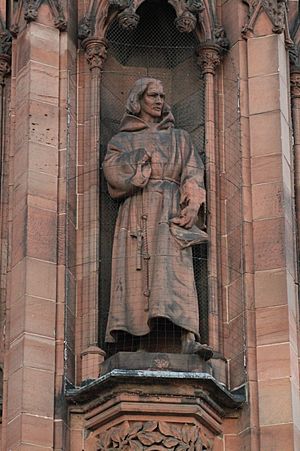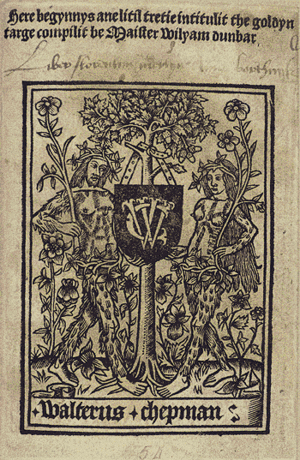William Dunbar facts for kids
William Dunbar (born around 1459 or 1460 – died by 1530) was a famous Scottish poet. He was known as a "makar," which means a court poet. He worked for King James IV in the late 1400s and early 1500s.
Dunbar wrote many different kinds of poems in the Scots language. His poems covered many topics and styles. He was probably from East Lothian, a place in Scotland. His last name is sometimes spelled Dumbar.
Contents
William Dunbar's Life Story
Dunbar first appears in history records in 1474. He was a new student at the University of St Andrews. Most students started university around age fourteen back then. This is why we think he was born in 1459 or 1460. He earned his first degree in 1477 and a master's degree in 1479. Later in his life, he became a priest, but we don't know exactly when.
In the early 1490s, Dunbar traveled with Scottish ambassadors. He went to Denmark and France. In 1501 and 1502, he also went to England with an ambassador named Andrew Forman.
From 1500, Dunbar worked for King James IV at the royal court. He received money every year for his work. His exact duties are not clear, but he was called a "servitour" or servant. Most of his poems were written during this time.
Some of Dunbar's poems were printed in 1508. These were part of the Chepman and Myllar prints. These were the first books ever printed in Scotland!
In 1510, Dunbar's yearly payment was increased. He received eighty pounds Scots. This was a lot of money at the time. For example, another famous person, Hector Boece, earned much less as a university principal.
The last time we know for sure about Dunbar was in May 1513. Records show he received his payment then. King James IV died in September 1513 at the Battle of Flodden. After the King's death, records stopped for a while. When they started again in 1515, Dunbar was no longer listed as working for the King.
A poem from 1517 is thought to be by Dunbar. It describes the Regent Albany leaving for France. This suggests Dunbar might have still been alive then. However, in a work from 1530 by Sir David Lyndsay, Dunbar is mentioned as being dead. So, we don't know the exact date he passed away.
Dunbar's Poems
William Dunbar's poems covered many different topics. He wrote about serious religious ideas and noble courtly events. But he also wrote funny poems. These often used strong language and were quite playful.
Poems for Special Events
Some of Dunbar's poems were written for public events. For example, The Thrissil and the Rois celebrated a royal wedding. It was written for the marriage of Margaret of England to King James in 1503. Another poem welcomed a French soldier, Bernard Stewart, in 1508. Dunbar also wrote about local events. He wrote about Queen Margaret's visit to Aberdeen in 1511.
He also wrote "In Honour of the City of London." This poem was later turned into a song by William Walton in 1937.
Religious and Moral Poems
Dunbar was a priest in the Roman Catholic Church in Scotland. Many of his poems were about religious topics. Rorate Celi Desuper is about the birth of Jesus. Of the Passioun of Christ is about Jesus' suffering. Done is a Battell on the Dragon Blak is about Jesus' resurrection. Ane Ballat of Our Lady praises the Virgin Mary. The Table of Confession talks about sin and confession.
He also wrote poems about good behavior. These include Of Deming and a group of poems about being careful. These are Of Discretioun in Asking, Of Discretioun in Geving, and Of Discretioun in Taking.
Some of Dunbar's religious poems were included in a famous collection. This collection was called the "Ballatis of Theologie" in the Bannatyne Manuscript.
Poems for Court Fun
Many of Dunbar's poems were meant to entertain the King, Queen, and other courtiers. Humor was a big part of these poems. Ane Dance in the Quenis Chalmer is a funny poem about life at court. The famous flyting with Kennedy was a battle of insults. Dunbar and another poet, Walter Kennedy, exchanged outrageous poetic insults. The Dance of the Seven Deadly Sins describes funny scenes in Hell.
Dunbar also wrote poems about courtly love. These include a short poem called Sweit Rois of Vertew. He also wrote a longer poem called The Goldyn Targe.
Other poems were more personal and entertaining. Of James Dog and its follow-up He Is Na Dog, He Is a Lam are about Dunbar's interactions with the Queen's wardrobe keeper.
Requests to the King and Personal Thoughts
William Dunbar sometimes wrote about his own life in his poems. Several poems were requests to the King for help. He often asked to be given a job in the church, which he called a "benefice." Quone Mony Benefices Vakit is an example of this. Sometimes, his requests were simpler. In The Petition of The Gray Horse, Auld Dunbar, he asked the King for new clothes for Christmas. The poem Schir, Ye Have Mony Servitouris showed his value to the king and country.
Dunbar also shared other parts of his private life. Lament for the Makaris is a poem about death. In it, he remembers other poets who had passed away. Meditatioun In Wyntir talks about getting older and his hopes that hadn't come true. On His Heid-Ake seems to be an excuse for not writing much. It talks about having a migraine.
Dunbar's Impact
Dunbar was very respected by the poets who came after him. Later critics, like Walter Scott, praised him highly. Scott said Dunbar was "unrivalled by any which Scotland has produced." This means he was considered the best among the Scottish poets, or makars.
About 101 poems are believed to be by Dunbar. Most people agree that at least 90 of these are truly his. There is some doubt about a story poem called The Freiris of Berwik. It's likely he did not write this one.
Dunbar's main story-telling poems are The Goldyn Targe and The Thrissil and the Rois. In The Goldyn Targe, the poet dreams he tries to block Dame Beauty's arrows. He uses Reason's "shield of gold." But he gets hurt and captured. He then sees the lady's true beauty. When she leaves, he feels sad. The sound of ships' guns wakes him up to the joy of a May morning. Dunbar explores a similar idea in a shorter poem, Beauty and the Prisoner. The Thrissil and the Rois is a poem celebrating the marriage of King James and Queen Margaret.
Most of Dunbar's work is occasional poetry. This means it was written for specific events or situations. These poems include personal and social jokes, complaints, prayers, and funny pieces. His most famous prayer is Lament for the Makaris. It repeats the line Timor mortis conturbat me (meaning "fear of death troubles me"). This poem remembers other Scottish poets who have died.
Dunbar's funny poems show his best writing. The Ballad of Kynd Kittok is a great example. It shows his silly and upside-down humor. This kind of humor is found in many of his poems. It also connects his work to later Scottish poets, like Robert Burns. Dunbar's jokes sometimes turn into strong criticism. Examples include The Satire on Edinburgh and The Dance of the Sevin Deidlie Synnis. He also wrote two funny poems about a court member, John Damian, who tried to fly. In The Flyting of Dunbar and Kennedy, he and his rival exchanged very rude insults. This poem also shows the differences between people speaking Middle Scots in the Lothians and those speaking Galwegian Gaelic in Carrick.
"Back to Dunbar"
In the mid-1900s, during the Scottish Literary Renaissance, Dunbar was very important. Many writers, like Hugh MacDiarmid and Sydney Goodsir Smith, tried to write like him. MacDiarmid even said they had to go "back to Dunbar." To help modern readers understand Dunbar's poems, a book was published in 2010. It was called Selected Poems of William Dunbar: An Interlinear Translation.
Dunbar is remembered at Makars' Court in Edinburgh. This is outside The Writers' Museum.
Works
- Ane Dance in the Quenis Chalmer
- The Dregy Of Dunbar
- The Fenyeit Freir of Tungland
- The Flyting of Dumbar and Kennedie
- The Twa Cummeris
- The Goldyn Targe
- He Is Na Dog, He Is a Lam
- On His Heid-Ake
- Of Ane Blak-Moir
- Of James Dog
- Lament for the Makaris (Timor mortis conturbat me)
- Meditatioun In Wyntir
- The Petition of The Gray Horse, Auld Dunbar
- Remonstrance to the King (Schir, ye have mony servitouris)
- The Thrissil and the Rois
- The Tua Mariit Wemen and the Wedo
See also
 In Spanish: William Dunbar para niños
In Spanish: William Dunbar para niños
- Lament for the Makaris, in which Dunbar talks about his 'poetic ability'
 | James Van Der Zee |
 | Alma Thomas |
 | Ellis Wilson |
 | Margaret Taylor-Burroughs |



